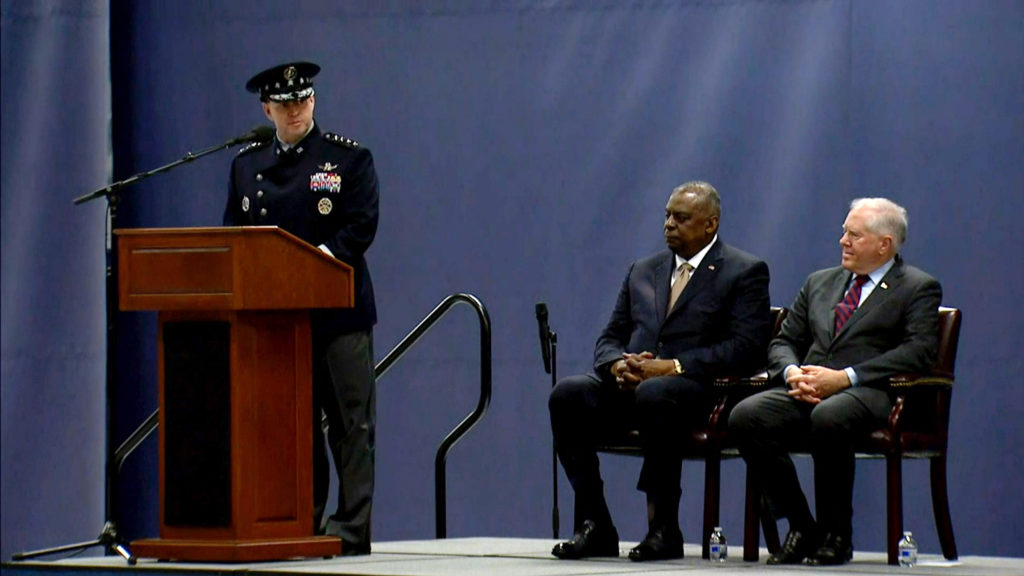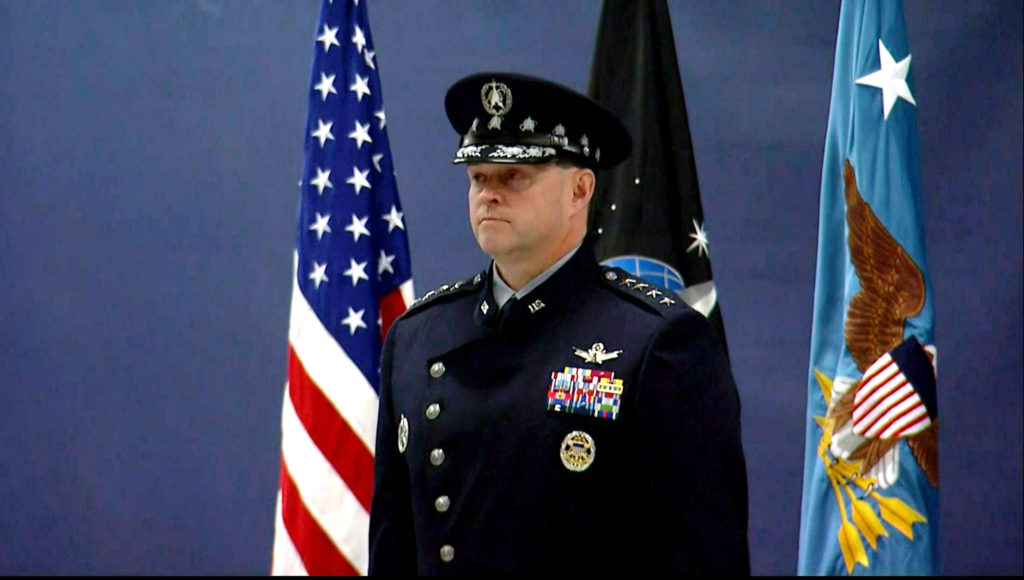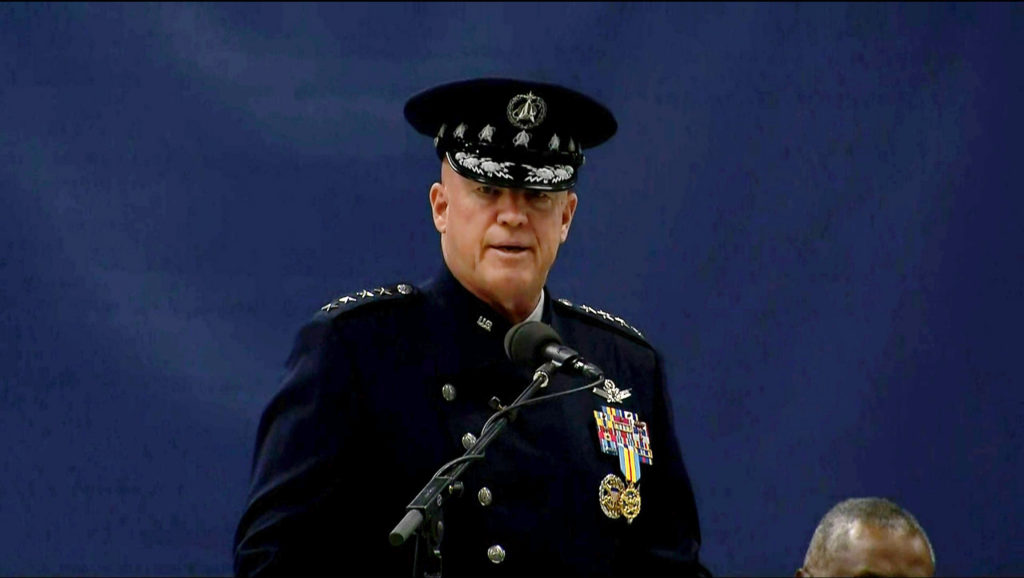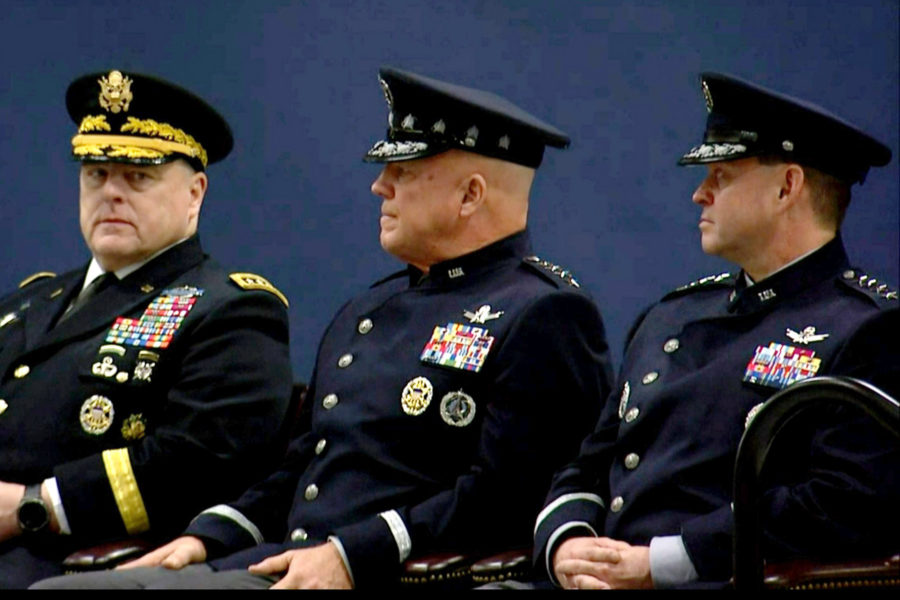Leadership of the Space Force changed hands Nov. 2, as Gen. B. Chance Saltzman succeeded Gen. John W. “Jay” Raymond as Chief of Space Operations in a pageantry-filled ceremony at Joint Base Andrews, Md., attended by top Pentagon officials, lawmakers, and industry leaders.
“We are here in this hangar at Andrews, literally witnessing history,” Chairman of the Joint Chiefs of Staff Gen. Mark A. Milley said. “It might as well be 1947 as it is today—that is what you are witnessing. You are witnessing the divorce of the Air Force from the Army, and now you’re witnessing the divorce of the Space Force from the Air Force.”
Air Force Secretary Frank Kendall added, “As the Secretary of the Air Force, I get to attend some pretty historic events. This one is right up there at the top.” Kendall officiated the change of responsibility ceremony. “I’m proud to work with these humble, incredibly capable, and approachable warriors and leaders we are celebrating here today.”

Still less than three years old, the Space Force now has its second-ever leader in Saltzman, who takes on the CSO job after spending the last two years as deputy chief of space operations for operations, cyber, and nuclear.
In his first remarks after officially taking over as CSO, Saltzman pledged that he would “work relentlessly to make the Space Force the combat-ready force that our nation needs.”
Addressing Guardians directly, Saltzman added that “my goal will be to provide you the resources, tools and training, and experiences needed to unlock your massive potential. … So get ready, because I’m going to need your best as well.”
Saltzman, who now is a member of the Joint Chiefs of Staff and leads some 15,000 personnel, got some early encouragement from both Defense Secretary Lloyd J. Austin III, who attended the ceremony, and Vice President Kamala Harris, who sent a message that was read aloud.
“There’s no one better to take the helm than Gen. Chance Saltzman,” Austin said. “He knows his way around the space domain. He’s operated satellites. He’s spent many nights at the Joint Space Operations Center during ICBM alerts. And for the past two years, he’s helped this new service get off the ground.”
In her letter, “The current and future Guardian workforce will be shaped by your leadership,” Harris wrote to Saltzman. “I look forward to further discussions about the challenges and opportunities facing military space operations.”

Raymond, meanwhile, retires Dec. 31 after 38 years in uniform. He led Air Force Space Command starting in 2016, then became the first member of the Space Force in December 2019. He also served as commander of U.S. Space Command from August 2019 to 2020.
Highlighting Raymond’s foundational role in the nation’s newest service’s, Milley noted that “Jay Raymond literally wrote the plans, literally wrote the doctrine, and literally developed the capabilities that we see deployed today.”
During his retirement ceremony, Raymond was feted with certificates from President Joe Biden and Harris, praising him for his “devotion to duty, honor, and country, in keeping with the long traditions of the finest military in the world,” and noting that his service as the first CSO “will make an impact for generations to come.”
Raymond also received the Defense Distinguished Service Medal for the second time in his career, and his wife Mollie Raymond received the Department of Defense Medal for Distinguished Public Service and a certificate of appreciation from the Space Force.
For his part, Raymond joked that he was now “homeless, unemployed, but humbled and grateful,” and called his time as CSO an “absolute privilege.”
Thanking his staff and leaders such as former Air Force Secretary Barbara M. Barrett, Vice Chief of Space Operations Gen. David D. Thompson, Chief Master Sergeant of the Space Force Roger A. Towberman, and Reps. Jim Cooper (D-Tenn.) and Mike Rogers (R-Ala.), Raymond also once more made the case for the Space Force’s importance and role in the joint force.
“In establishing the Space Force, the United States capitalized on an opportunity to elevate space to a level that’s consistent with its importance to our national security, and to ensure U.S. and global leadership in the domain,” Raymond said. “And just as the space domain was critical to winning the Cold War, the Space Force represents our nation’s best opportunity to secure peace and deter great power conflict today and into the future.”

